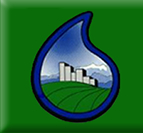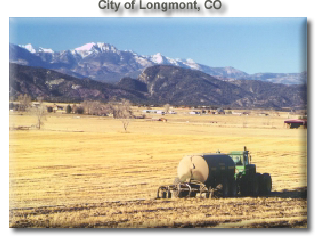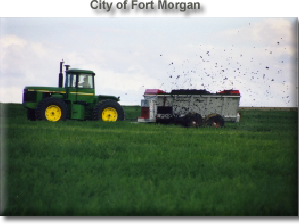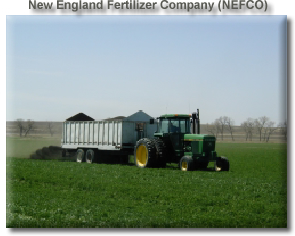 |
 |
|
Parker Ag Services, based upon requests from farmers in Prowers County wanting biosolids, developed a proposal and was ultimately selected as a subcontractor to SynaGro. SynaGro is a transportation firm that won the long-term land application contract with New York City. Parker Ag is contracted to provide biosolids transportation, application and management services for about 100 wet tons per day. Due to Parker Ag’s unique style of public education, this project enjoys some of the best support of any large-scale land application program in the United States. This project was awarded the USEPA Public Education Award in 1999. This project was also presented an Environmental Achievement Award in 2001, which was the first biosolids project in the United States to receive such an award.
Parker Ag started managing the City of Longmont’s land application program in January 1998 when the City believed that the program might be able to operate for another three to five years. Through Parker Ag’s understanding of the agricultural community and diligent work with the farmers, Parker Ag has been able to demonstrate that land application is a sound management practice in the area with a long-term potential. This was accomplished by implementing the use of injection, low compaction applicators and the implementation of a nitrogen management.
The City of Fort Morgan had accumulated over twenty years of dried biosolids at their drying beds located within close proximity of the City Park. Traditional transportation and land application would have cost the City in excess of $500,000. Due to Parker Ag’s unique experience in biosolids management, Parker Ag was retained by the City to have the material classified as a Class A material and to reclaim the drying beds using the material so that the City Park could be extended into the area. This concept saved the City almost 90% of the original budget.
The New England Fertilizer Company produces heat dried Class A biosolids fertilizer for the Massachusetts Water Resources Authority. Periodically, marketing of this product may be impacted by the qualities of the input biosolids. In these cases, Parker Ag accepts railcars of the dried biosolids and transports and applies the product to various sites in Colorado. Such projects include reclamation of the banks of the Arkansas River in Leadville, which is a Superfund Project due to the impacts of a century of mining.
At the request of the Tri-County Board of Health and the Douglas County Zoning Office, Parker Ag developed a cost effective, approved alternative for septage management. Parker Ag collects septage from temporary holding tanks placed in the yards of regional haulers. Periodically, Parker Ag will remove this material and inject it into the soil in a manner similar as with biosolids. This approach, which meets CDPH&E and USEPA requirements, has alleviated the problems associated with collection and disposal of septage in Douglas and Elbert Counties. |
Parker
Ag Services, LLC
Phone: (719) 775-9870 ![]() Toll
Free: 888-BIOSOLIDS
Toll
Free: 888-BIOSOLIDS ![]() Fax:
(719) 775-9871
Fax:
(719) 775-9871
53036 N Hwy 71 ![]() Limon,
CO
Limon,
CO ![]() 80828
80828
E-Mail: Scharpm@aol.com











